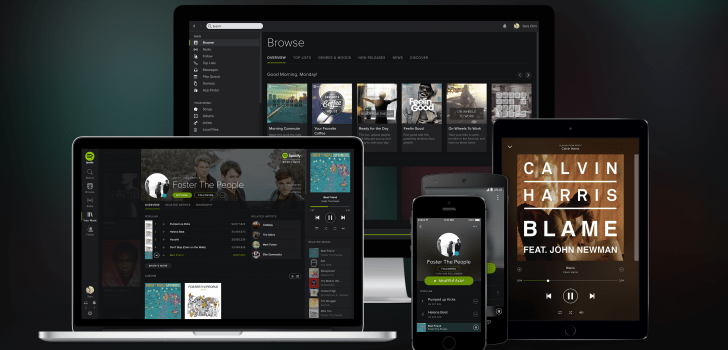Leading music streaming service Spotify has just revamped its privacy policy and the changes mean it will collect significantly more data about its customers than it did previously. It will also now sell the information to advertisers.
When opening the Spotify service, users are greeted with a request to accept the new terms and conditions before continuing to the program. You either accept the creepy new terms or lose access to the app.
Taxi hailing app Uber did a similarly shady update in July, where users were forced to allow the app to track them around the clock.
Like most clickwrap agreements, a simple check of the “yes” button is sufficient. However, in reality, the majority of users never read the fine print about just how Spotify intends to invade their privacy.
Of note is Section 3.3 regarding information stored on a user’s mobile device. It provides that, “With your permission, we may collect information stored on your mobile device, such as contacts, photos or media files. Local law may require that you seek the consent of your contacts to provide their personal information to Spotify, which may use that information for the purposes specified in this Privacy Policy.”
In essence, Spotify is informing users that if they use the service, their contacts and photos are up for grabs and can be used by the company in any way it likes.
Another section of significant importance is Section 3.4 regarding location and sensor information of users. “Depending on the type of device that you use to interact with the Service and your settings, we may also collect information about your location based on, for example your phone’s GPS location or other forms of locating mobile devices (e.g., Bluetooth). We may also collect sensor data (e.g., data about the speed of your movements, such as whether you are running, walking, or in transit).”
In other words, Spotify tracks your location at any time and then determines if you are running or walking.
Probably most notable is Section 5.2.1 regarding marketing and advertising. “We may share information with advertising partners in order to send you promotional communications about Spotify or to show you more tailored content, including relevant advertising for products and services that may be of interest to you, and to understand how users interact with advertisements. The information we share is in a de-identified format (for example, through the use of hashing) that does not personally identify you.”
So in addition to logging lots of data about its user, the company will now sell all that data to advertisers.
There is also no definition or explanation of the term “media files,” but as written it is likely to include a user’s chosen music, videos, podcasts, saved articles, screenshots, downloaded e-books and more.
The new policy also does not distinguish practices between users of the free service and users who pay a premium for a service.
Obviously this information is extremely valuable to Spotify, especially with competitors like Apple Music entering the market.
Yet Spotify is now making a privacy land grab and requiring their paying subscribers to either accept it or quit the service.
Whether users of Spotify take note of the changes before continuing to use the service remains to be seen. What is sure is that users’ lives got a lot less private.
Stay Connected